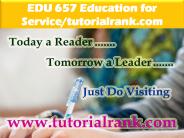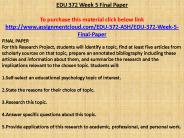Edu 657 Ashford PowerPoint PPT Presentations
All Time
Recommended
For more course tutorials visit www.tutorialrank.com Tutorial Purchased: 5 Times, Rating: A EDU 657 Week 1 Colonial Higher Education, 1636-1784 EDU 657 Week 1 DQ 1 Colleges in the Colonial Era EDU 657 Week 1 DQ 2 Colonial Revival Colleges
| PowerPoint PPT presentation | free to download
For more course tutorials visit www.tutorialrank.com Tutorial Purchased: 5 Times, Rating: A EDU 657 Week 1 Colonial Higher Education, 1636-1784 EDU 657 Week 1 DQ 1 Colleges in the Colonial Era EDU 657 Week 1 DQ 2 Colonial Revival Colleges EDU 657 Week 1 Reflective Journal
| PowerPoint PPT presentation | free to download
For more course tutorials visit www.tutorialrank.com Tutorial Purchased: 5 Times, Rating: A EDU 657 Week 1 Colonial Higher Education, 1636-1784 EDU 657 Week 1 DQ 1 Colleges in the Colonial Era EDU 657 Week 1 DQ 2 Colonial Revival Colleges EDU 657 Week 1 Reflective
| PowerPoint PPT presentation | free to download
For more course tutorials visit www.tutorialrank.com Tutorial Purchased: 5 Times, Rating: A EDU 657 Week 1 Colonial Higher Education, 1636-1784 EDU 657 Week 1 DQ 1 Colleges in the Colonial Era EDU 657 Week 1 DQ 2 Colonial Revival Colleges EDU 657 Week 1 Reflective Journal EDU 657 Week 2 DQ 1 Creating the American Way
| PowerPoint PPT presentation | free to download
For more course tutorials visit www.tutorialrank.com Tutorial Purchased: 5 Times, Rating: A EDU 657 Week 1 Colonial Higher Education, 1636-1784 EDU 657 Week 1 DQ 1 Colleges in the Colonial Era EDU 657 Week 1 DQ 2 Colonial Revival Colleges
| PowerPoint PPT presentation | free to download
"For more classes visit www.snaptutorial.com EDU 657 Week 1 Colonial Higher Education, 1636-1784 EDU 657 Week 1 DQ 1 Colleges in the Colonial Era EDU 657 Week 1 DQ 2 Colonial Revival Colleges EDU 657 Week 1 Reflective Journal EDU 657 Week 2 DQ 1 Creating the American Way EDU 657 Week 2 DQ 2 Resilience in American Higher Education EDU 657 Week 2 Higher Education, 1785-1890 "
| PowerPoint PPT presentation | free to download
" For more course tutorials visit www.tutorialrank.com EDU 657 Week 1 Colonial Higher Education, 1636-1784 EDU 657 Week 1 DQ 1 Colleges in the Colonial Era EDU 657 Week 1 DQ 2 Colonial Revival Colleges EDU 657 Week 1 Reflective Journal "
| PowerPoint PPT presentation | free to view
For more course tutorials visit www.tutorialrank.com EDU 657 Week 1 Colonial Higher Education, 1636-1784 EDU 657 Week 1 DQ 1 Colleges in the Colonial Era EDU 657 Week 1 DQ 2 Colonial Revival Colleges
| PowerPoint PPT presentation | free to download
EDU 645 Entire Course (Ash) For more course tutorials visit www.edu645.com EDU 645 Week 1 Assessment Crisis. Watch the video “Linda Darling-Hammond on Competing Internationally.” Then, explain the current crisis in America with regards to education and assessment. What do you think the cause(s) of this crisis might be? What are the possible implications? Explain your reasoning
| PowerPoint PPT presentation | free to download
For more course tutorials visit www.tutorialrank.com Tutorial Purchased: 6 Times, Rating: A+ EDU 657 Entire Course, New Coursework Business - General Business Colleges in the Colonial Era. In Chapter One, Thelin (2011) mentioned nine surviving colleges founded before 1781:
| PowerPoint PPT presentation | free to download
EDU 657 course is a grassroots open education project with a model for lifelong learning.
| PowerPoint PPT presentation | free to download
Check this A+ tutorial guideline at http://www.assignmentcloud.com/EDU-657-ASH/EDU-657-Week-2-Higher-Education
| PowerPoint PPT presentation | free to download
For more course tutorials visit www.tutorialrank.com Tutorial Purchased: 5 Times, Rating: A EDU 657 Week 1 Colonial Higher Education, 1636-1784 EDU 657 Week 1 DQ 1 Colleges in the Colonial Era EDU 657 Week 1 DQ 2 Colonial Revival Colleges EDU 657 Week 1 Reflective Journal EDU 657 Week 2 DQ 1 Creating the American Way EDU 657 Week 2 DQ 2 Resilience in American Higher Education EDU 657 Week 2 Higher Education, 1785-1890 EDU 657 Week 3 DQ 1 Captains of Industry EDU 657 Week 3 DQ 2 America Goes to College EDU 657 Week 3 Higher Education, 1880-1920 EDU 657 Week 3 Reflective Journal EDU 657 Week 4 DQ 1 Success and Excess EDU 657 Week 4 DQ 2 Cost of College, 1920-1945 EDU 657 Week 4 Higher Education, 1920-1945 EDU 657 Week 4 Reflective Journal EDU 657 Week 5 DQ 1 Gilt by Association EDU 657 Week 5 DQ 2 Coming of Age in America
| PowerPoint PPT presentation | free to download
EDU 657 course is a grassroots open education project with a model for lifelong learning.
| PowerPoint PPT presentation | free to download
Check this A+ tutorial guideline at http://www.assignmentcloud.com/EDU-657-ASH/EDU-657-Complete-Class-Guide EDU 657 Week 1 Colonial Higher Education EDU 657 Week 1 DQ 1 Colleges in the Colonial Era EDU 657 Week 1 DQ 2 Colonial Revival Colleges EDU 657 Week 1 Reflective Journal EDU 657 Week 2 DQ 1 Creating the American Way EDU 657 Week 2 DQ 2 Resilience in American Higher Education EDU 657 Week 2 Higher Education EDU 657 Week 3 DQ 1 Captains of Industry EDU 657 Week 3 DQ 2 America Goes to College EDU 657 Week 3 Higher Education EDU 657 Week 3 Reflective Journal EDU 657 Week 4 DQ 1 Success and Excess
| PowerPoint PPT presentation | free to download
Critically reflect on the impact of topics, trends, and events of 1970-2000. Reflect on yourself as a graduate student who may one day teach in higher education. How can you avoid some of the mistakes faculty made from 1970-2000?
| PowerPoint PPT presentation | free to download
Critically reflect on the personal impact of the foundations of education. Reflect on a time when you studied about the history of the Colonial Era in grade school, middle school, high school or college. What surprised you to discover about higher education during the Colonial era? Have your perceptions changed as a result of examining a few of the historical, political, ethical and/or economic foundations of higher education during this timeframe? How has this knowledge impacted your perceptions and experiences about higher education? Summarize how this information will change your teaching.
| PowerPoint PPT presentation | free to download
Critically reflect on the impact of topics, trends, and events of historical eras on higher education and the dynamics surrounding the university-builders in the formative decades between 1880 -1920. Think about what it would have been like to be a college student during this time. Then reflect on the time when you first enrolled in your graduate program. What was your experience? Where you excited about the prospects of one day teaching at the higher education level? What is the subject you would most likely enjoy teaching? Do you think you could have taught the same subject during 1880 -1920? Knowing a little more about the history of higher education, have your perceptions changed about higher education in general.
| PowerPoint PPT presentation | free to download
Critically reflect on the impact of topics, trends, and events of 1920-1945. Have you met or do you know of anyone who taught during this time? If so, what do they say about the advantages and disadvantages of teaching during this time period? As a future higher education educator do you feel that your opportunities have increased as compared to what you read about opportunities for faculty from 1920 -1945? What did faculty do as far as furthering their careers with regards to scholarship and teaching? What do you plan to do to further your career with regards to scholarship and teaching? Do you look forward to publishing? Do you have a particular workshops or training in mind? Write a book? Share your thoughts.
| PowerPoint PPT presentation | free to download
In this course, we have examined various topics about the reconfiguration of American Higher Education from 1673 to the present. After watching the short video Complex Change in Higher Education by Fred Buining (http://www.youtube.com/watch?), reflect on various changes that have influenced the reconfiguration of American higher education in the 21st century.
| PowerPoint PPT presentation | free to download
Your readings described the influences of several topics about the challenges and issues in higher education from 1970-2000. Discuss one topic that addresses the institutional, societal, student, faculty, curriculum, governance or financial issues that were significantly impacted from 1970 -2000. After viewing Dr. Hannah Holborn Grey’s presentation, Uses (and Misuses) of the University Today (http://www.youtube.com/watch?&), incorporate one of her suggested uses and one of her noted misuses of the university today in your paper.
| PowerPoint PPT presentation | free to download
Check this A+ tutorial guideline at http://www.assignmentcloud.com/EDU-657-ASH/EDU-657-Week-3-Higher-Education-1880-1920 For this assignment you will explore several topics about the Age of University Building and the “Golden Age” of colleges. Using the free website Timeglider (http://www.timeglider.com/) or Microsoft Word (http://www.microsoft.com/education/en-us/teachers/how-to/Pages/creating-timeline.aspx), create a timeline of five or more significant events and/or topics
| PowerPoint PPT presentation | free to download
From 1920-1945, there was significant expansion and reforms in higher education. Reflect upon the opportunities to attend college for women during this time period. Women made up about 40% of the undergraduate enrollments in 1940. This was remarkable considering that women were not permitted to earn a bachelor’s degree just 60 years prior to 1940. Also of significance were the women’s colleges of the privileged elite such as Wellesley, Radcliffe, Smith, Vassar, and Barnard to name a few. Examine colleges for women during this time period and compare them to your educational experiences today.
| PowerPoint PPT presentation | free to download
Thelin (2011) mentioned that from World War I to World War II, university and college enrollments increased dramatically. However, the retention of students presented a challenge during this time period. College administrators had some difficulty managing students because of the expanded number of students being enrolled. Discuss the role and responsibilities of faculty members during this time. How have these roles and responsibilities changed today? How have these stayed the same? Do you think that college administrators and faculty members did the best they could to retain their students? Why or why not? What could they have done better?
| PowerPoint PPT presentation | free to download
From 1945-1970, a new set of problems helped to transform higher education. After 1949 there was an explosion of enrollments due to governmental agencies that recognized that higher education had been proven effective, even during the war. This led them to create public policies at both the state and federal level.
| PowerPoint PPT presentation | free to download
Check this A+ tutorial guideline at http://www.assignmentcloud.com/EDU-657-ASH/EDU-657-Week-1-Colonial-Higher-Education In Chapter One, Thelin (2011) described the influences of several topics and issues in higher education during the Colonial era. Choose a historical, political, ethical and/or economic issue under one of the following topics: § Governance and structure § College finances § Religion and the college § Philanthropy § The curriculum § Student diversity and experimentation § The limits of instructional purpose and educational mission Describe and provide examples for the topic you selected and how it influenced higher education during the Colonial era. In addition, please
| PowerPoint PPT presentation | free to download
Check this A+ tutorial guideline at http://www.assignmentcloud.com/EDU-657-ASH/EDU-657-Week-3-DQ-2-America-Goes-to-College The age of university-building was also the golden age of the college. Attending college was popular and fashionable during 1890 through 1920. Obtaining a bachelor’s degree was a way for newly affluent families to enhance their social position.
| PowerPoint PPT presentation | free to download
Thelin (2011) noted that the English universities Oxford and Cambridge greatly influenced early American higher education. In addition, Oxford and Cambridge were autonomous, privately endowed and linked to a federation. The “collegiate system” of combining learning and living was a seminal plan for higher education that college founders tried to capture for the American colonies. Discuss the various ways in which early American Colonial colleges did "not" emulate or resisted replicating the Oxford-Cambridge ideal. Describe the reasons for these changes and what the change agents were. Consider important factors such as college funding, curriculum, religion, architecture and the student population
| PowerPoint PPT presentation | free to download
The wealth and energy between 1880 and 1910 was a unique and dynamic period in higher education. During this time the stock market was volatile and the rules that governed higher education were mostly absent. In addition, there was an abundance of industrial wealth, and a new level of philanthropic generosity toward higher education. Uncertainty and diversity were characteristics of this time period.
| PowerPoint PPT presentation | free to download
Medical schools during this time represented a good example of American society’s enchantment for education without the overly strict rules and standards. Reflect on the role of Medical Colleges in higher education during the first half of the nineteenth century. Consider the educational preparation and requirements for medical doctors during this era. How do you feel that differs today?
| PowerPoint PPT presentation | free to download
Large scale philanthropy contributors who offered substantial gifts such as foundations, trusts, and estates were necessary to higher education budgets in order to pay for salaries, services and the construction of new buildings. The transformation of philanthropy in American higher education was the coming together of industry and religion in what was termed the “Protestant work ethic.” Discuss why this was important to wealthy entrepreneurs.
| PowerPoint PPT presentation | free to download
In Chapter One, Thelin (2011) mentioned nine surviving colleges founded before 1781: Harvard, William and Mary, Yale, Princeton, Columbia, Brown, Dartmouth, Rutgers, and Pennsylvania. Many feel that these colleges stand out as quality higher education institutions that have acquired prestige and longevity. Do you agree with these viewpoints? Consider how these colleges influenced perceptions of higher education today. What about the quality of education then and online learning now? Relate how these trends and events still impact higher education today. Check this A+ tutorial guideline at http://www.assignmentcloud.com/EDU-657-ASH/EDU-657-Week-1-DQ-1-Colleges-in-the-Colonial-Era
| PowerPoint PPT presentation | free to download
Summarize the changes in the price of going to college from 1920-1945. Consider student employment opportunities and positive influences of the various relief work programs such as the public work projects during this time. How did colleges and universities benefit from them? Do you feel that a similar type of public work project(s) could work today? Why or why not? What are some options that students have today to pay for college? Give your perspectives on how college education could be funded.
| PowerPoint PPT presentation | free to download
From 1970 -2000, most higher education institutions encountered various challenges and issues. Although higher education made an effective transition to mass education access, it was more difficult to transition to universal education access. In addition, because of the diversity of students who were entering college higher education, higher education institutions required tailoring. Discuss the impact of topics, trends, and events of 1970-2000 era on higher education. Explain the components that contributed to the “Coming of Age” in American higher education. What were the main issues during this time period? Do you feel that higher education institutions solved most of the issues of 1970 -2000? Why or why not?
| PowerPoint PPT presentation | free to download
Using ProQuest, locate two articles about the emergence of global universities (online education). Provide a summary of your articles and the reference links. Discuss the critical findings related to two of any of the following topics:
| PowerPoint PPT presentation | free to download
Check this A+ tutorial guideline at http://www.assignmentcloud.com/EDU-623-ASH/EDU-623-Complete-Class-Guide EDU 623 Week 1 Assignment No Child Left Behind EDU 623 Week 1 DQ 1 Skills Needed for Master of Education EDU 623 Week 1 DQ 2 Effective Teachers
| PowerPoint PPT presentation | free to download
For more classes visit www.snaptutorial.com EDU 645 Complete Class Business - General Business EDU 645 Week 1 Assessment Crisis. Watch the video “Linda Darling-Hammond on Competing Internationally.” Then, explain the current crisis in America with regards to education and assessment. What do you think the cause(s) of this crisis might be? What are the possible implications? Explain your reasoning. Respond substantively to at least two of your peers. Analyze their responses and compare and contrast their reasoning with yours.
| PowerPoint PPT presentation | free to download
Check this A+ tutorial guideline at http://www.assignmentcloud.com/EDU-673-ASH/EDU-673-Week-3-Journal
| PowerPoint PPT presentation | free to download
Check this A+ tutorial guideline at http://www.assignmentcloud.com/EDU-673-ASH/EDU-673-Week-2-Journal
| PowerPoint PPT presentation | free to download
Check this A+ tutorial guideline at http://www.assignmentcloud.com/EDU-673-ASH/EDU-673-Complete-Class-Guide EDU 673 Week 1 Brain Research Supports Differentiation EDU 673 Week 1 DQ 1 Key Principles of Effective Differentiation EDU 673 Week 1 DQ 2 Educational Neuroscience EDU 673 Week 2 DQ 1 Fluid and Fixed Mindsets
| PowerPoint PPT presentation | free to download
Read Chapter 11of the course text. In a minimum of 300 words, explain the five ways new technology can be used. Respond to at least two of your classmates’ postings. Check this A+ tutorial guideline at http://www.assignmentcloud.com/EDU-623-ASH/EDU-623-Week-5-DQ-2-Technological-Advancement For more classes visit http://www.assignmentcloud.com
| PowerPoint PPT presentation | free to download
Check this A+ tutorial guideline at http://www.assignmentcloud.com/EDU-675-ASH/EDU-675-Complete-Class-Guide EDU 675 Week 1 Assignment Professional Development and Research EDU 675 Week 1 DQ 1 Professional Learning Communities EDU 675 Week 1 DQ 2 School Culture and Differentiated Instruction EDU 675 Week 1 Journal Implementing the Professional Learning Community
| PowerPoint PPT presentation | free to download
Philosophical perspectives play an important role in what is taught in the classroom. In a minimum of 300 words, explain the views of progressivism, essentialism, and perennialism. Which philosophical perspective is most closely related to your philosophy? Explain. Respond to at least two of your classmates’ postings. Check this A+ tutorial guideline at http://www.assignmentcloud.com/EDU-623-ASH/EDU-623-Week-5-DQ-1-Philosophical-Perspectives For more classes visit http://www.assignmentcloud.com
| PowerPoint PPT presentation | free to download
Check this A+ tutorial guideline at http://www.assignmentcloud.com/EDU-623-ASH/EDU-623-Week-4-DQ-1-Educational-History What impact has history had on education? What influences are still impacting education today? Select a time period or historical educational movement that you believe still impacts schools today and explain why. In a minimum of 300 words, answer the questions above. Post your response and respond to at least two of your classmates’ postings For more classes visit http://www.assignmentcloud.com
| PowerPoint PPT presentation | free to download
To purchase this material click below link http://www.assignmentcloud.com/EDU-372-ASH/EDU-372-Week-5-Final-Paper For more classes visit www.assignmentcloud.com FINAL PAPER For this Research Project, students will identify a topic, find at least five articles from scholarly sources on that topic, prepare an annotated bibliography including these articles and information about them, and summarize the research and the implications relevant to the chosen topic. Students will: 1.Self-select an educational psychology topic of interest.
| PowerPoint PPT presentation | free to download
To purchase this material click below link http://www.assignmentcloud.com/EDU-372-ASH/EDU-372-Week-2-Applied-Questions For more classes visit www.assignmentcloud.com Respond to at least three of the questions listed below. Your response must be in proper APA format and include evidence from the text and at least one other scholarly resource to support your answers. Your response should be no more than five pages in length (not including title and reference pages).
| PowerPoint PPT presentation | free to download
Read the article “What Should Parents Know about Standardized Testing in School?” and watch the video “Notebook: Standardized tests.” Think about the current testing in your state. How does it guide instruction? What types of pressures are put on students, teachers, and administration? In a minimum of 300 words, respond to the questions above and briefly explain your opinion on standardized testing. Respond to at least two of your classmates postings. Check this A+ tutorial guideline at http://www.assignmentcloud.com/EDU-623-ASH/EDU-623-Week-3-DQ-1-Standardized-Testing For more classes visit http://www.assignmentcloud.com
| PowerPoint PPT presentation | free to download
Check this A+ tutorial guideline at http://www.assignmentcloud.com/EDU-673-ASH/EDU-673-Week-5-Differentiating-for-Learning-Profile For this assignment you will need a lesson plan or unit that includes measurable learning outcomes. You may continue to use the lesson plan from previous weeks, create a new one, or modify one that you have found.
| PowerPoint PPT presentation | free to download
Check this A+ tutorial guideline at http://www.assignmentcloud.com/EDU-623-ASH/EDU-623-Week-3-Assignment-Lesson-Plan-Critique Obtain, from the internet or a school, a lesson plan that you believe is of high quality and could be used in your current or future classroom. Critique the lesson plan by examining the objectives, activities, and assessments provided. Organize your critique in the following manner: a. Introduction: Type of lesson, grade level, subject, etc. b. Objective c. Activities d. Assessment e. Conclusion: Why you would use this plan Attach the lesson plan with your critique. This assignment should not exceed two pages (not including the title and reference pages). You must cite your reference for the lesson plan as well as one additional resource. Remembertociteallreferencesusing APA style. For more classes visit http://www.assignmentcloud.com
| PowerPoint PPT presentation | free to download
Check this A+ tutorial guideline at http://www.assignmentcloud.com/EDU-673-ASH/EDU-673-Week-1-Brain-Research-Supports-Differentiation In a three- to five-page paper (not including title and reference pages): a. Analyze how neuroscientific research findings and recent discoveries regarding how the brain learns support differentiation in the classroom. b. Discuss how insights into the learning process affirm the importance of differentiation.
| PowerPoint PPT presentation | free to download
Check this A+ tutorial guideline at http://www.assignmentcloud.com/EDU-673-ASH/EDU-673-Week-2-DQ-2-Effective-Differentiated-Curriculum Visit the Discovery Education: Lesson Plan Library website and locate a lesson plan that represents the grade level and subject area you are teaching or are interested in teaching.
| PowerPoint PPT presentation | free to download
Check this A+ tutorial guideline at http://www.assignmentcloud.com/EDU-623-ASH/EDU-623-Week-4-Assignment-Philosophy-of-Education To this point, we have learned about many influences impacting education today. We have been introduced to legislation, curriculum and instruction, standardized testing, and the history of education. As educators or future educators, we will have a large impact on the success of our students. It is important for you to analyze why you have chosen this field. In a 1 -2 page paper (not including the title and reference pages): a. Explain your philosophy of education, and b. Describe the influences and experiences that have developed this philosophy. At a minimum, use one external source, in addition to the course text. Remembertociteallreferencesusing APA style For more classes visit http://www.assignmentcloud.com
| PowerPoint PPT presentation | free to download
To purchase this material click below link http://www.assignmentcloud.com/EDU-372-ASH/EDU-372-Week-5-DQ-1-Corporal-Punishment-Debate For more classes visit www.assignmentcloud.com Effective teachers tend to use a variety of classroom management strategies to meet the developmental and learning needs of their students. Some states are still using corporal punishment as a form of behavior management. Watch the CBS Report, “Corporal Punishment in Schools”
| PowerPoint PPT presentation | free to download
Check this A+ tutorial guideline at http://www.assignmentcloud.com/EDU-623-ASH/EDU-623-Week-5-Assignment-Article-Review-on-Technology-in-Education Research a current article (2009 or newer) on technology in the classroom. In 2-3 pages (excluding title and reference pages) summary of the article, explain how this technological advancement will shape education in the future. In a two- to three-page summary of the article, explain how this technological advancement will shape education in the future. Organization: a. Summary of article b. Impact technology will have on education c. Personal opinion on how you believe technology will shape education in the future d. Conclusion The article you select must be cited in APA format For more classes visit http://www.assignmentcloud.com
| PowerPoint PPT presentation | free to download
Accessed at http://www.epi.state.nc.us/epi/gcdc/manual/outbreakinvest.pdf Consumers Advised That Recent ... even long after an investigation has been ...
| PowerPoint PPT presentation | free to view
Cummings hopes that by creating the world's best model of the water molecule, ... The center's mission is to create space colonies whose inhabitants will live on ...
| PowerPoint PPT presentation | free to view
























































